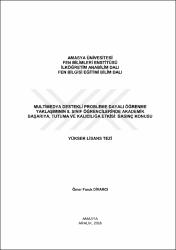| dc.contributor.advisor | Saltan, Fatih | |
| dc.contributor.author | Divarcı, Ömer Faruk | |
| dc.date.accessioned | 2022-03-09T14:55:59Z | |
| dc.date.available | 2022-03-09T14:55:59Z | |
| dc.date.issued | 2016 | |
| dc.identifier.uri | https://tez.yok.gov.tr/UlusalTezMerkezi/TezGoster?key=DPTyuy3wRPq_qvCPSqUB65a4oqsAuDg3EFID91XmIeXu7qAJ63hM5YVPtAItXX-M | |
| dc.identifier.uri | https://hdl.handle.net/20.500.12450/1764 | |
| dc.description.abstract | Bu araştırmanın genel amacı, "Multimedya Destekli Probleme Dayalı Öğrenme" yaklaşımının fen eğitiminde etkililiğinin incelenmesidir. Bu bağlamda "Multimedya Destekli PDÖ" yaklaşımının 8. sınıf "basınç" konusunun öğretiminde kullanılmasının fen ve teknoloji dersi akademik başarısı, fen ve teknoloji dersine karşı tutum, problem çözmeye karşı tutum ve kalıcılık üzerindeki etkilerinin incelemesi hedeflenmiştir. Araştırma ön test-son test kontrol gruplu yarı deneysel desen kullanılarak yürütülmüştür.Çalışma grubunu, Amasya ili Taşova ilçesindeki bir ortaokulda 2014-2015 eğitim-öğretim yılında 8. sınıfta öğrenim gören 40 öğrenci oluşturmuştur. "Basınç" konusu, kontrol grubunda (N=20) geleneksel yöntem ile deney grubunda (N=20) ise "Multimedya Destekli PDÖ" yaklaşımı ile işlenmiştir. Dersler, araştırmacı tarafından 2,5 hafta (10 ders saati) boyunca yürütülmüştür. Veri toplama işlemi "Basınç Konusu Akademik Başarı Testi", "Fen ve Teknoloji Dersine Karşı Tutum Ölçeği" ve "Problem Çözme Tutum Ölçeği" kullanılarak yapılmıştır. Toplanan veriler uygun bir istatistiki program ile analiz edilmiştir. Verilerin analizinde aritmetik ortalama ve standart sapma hesaplamalarının yanı sıra "Shapiro-Wilks Testi", "İlişkili Örneklemler t-Testi", "Bağımsız Örneklemler t-Testi", "Wilcoxon Testi" ve "Mann Whitney U Testi" kullanılmıştır. Araştırma ile "Multimedya Destekli Probleme Dayalı Öğrenme" yaklaşımının ve geleneksel yaklaşımın fen ve teknoloji dersi akademik başarısını anlamlı bir şekilde arttırdığı sonucuna ulaşılmıştır. Buna ek olarak "Multimedya Destekli Probleme Dayalı Öğrenme" yaklaşımı akademik başarıyı arttırmada geleneksel yaklaşıma göre anlamlı bir şekilde daha başarılı bulunmuştur. Geleneksel yaklaşımın fen ve teknoloji dersine karşı tutuma ve problem çözmeye yönelik tutuma anlamlı bir etkisi bulunamamıştır. "Multimedya Destekli Probleme Dayalı Öğrenme" yaklaşımı ise fen ve teknoloji dersine karşı tutum ve problem çözmeye yönelik tutum üzerinde olumlu yönde anlamlı bir etkiye sahiptir. Ayrıca "Multimedya Destekli Probleme Dayalı Öğrenme" yaklaşımı öğrenmelerin kalıcılığını sağlamada geleneksel yaklaşıma göre daha başarılı bulunmuştur. Fakat kalıcılık puanları arasında bulunan fark istatistiksel açıdan bir anlam ifade etmemektedir. | en_US |
| dc.description.abstract | The main purpose of this study is to examine the efficiency of "Multimedia supported Problem Based Learning" in science education. In this respect, it is aimed to examine the effects of the "Multimedia Supported Problem-based Learning " as for "The Subject of Pressure" in science and technology lesson on the 8th grade students' academic success, attitude towards the lesson, attitude towards the problem solving and permanence of the learning. The research has been conducted by using quasi-experimental design in which the control group has been examined through pre-test and post-test. The study group consists of 40 students who were in the 8th grade at a secondary school in Taşova, Amasya in 2014-2015 academic year. "The Subject of Pressure" has been studied in control group (N=20) through the traditional approach and in the experimental group (N=20) through the "Multimedia Supported Problem-based Learning" approach. The lessons have been conducted for two and a half weeks (10 hours) by the researcher. The data were collected with "The Test of Academic Success on the Subject of Pressure", "The Scale of the Attitude Towards Science and Technology Lesson" and "The Scale of the Attitude Towards Problem Solving". The collected data has been analyzed by an appropriate statistical program. In the process of data analysis the arithmetic mean and standard deviation have been taken advantage of beside "Shapiro-Wilks Test", "Paired Samples t-Test", "Indepented Samples t-Test", "Wilcoxon Test" and "Man Whitney U Test". Through this study, it is concluded that "Multimedia Supported Problem-based Learning" approach and traditional approach increase the academic success to a certain extend in Science and Technology lesson. Furthermore, it is found out that "Multimedia Supported Problem-based Learning" approach is significantly more successful than traditional approach in relation to the academic success. It was also found that traditional approach does not have a significant effect on the attitude towards science and technology lesson or attitude towards the problem solving. On the other hand, "Multimedia Supported Problem-based Learning" approach has significant effect on students' attitude towards science and technology lesson and the attitude towards problem solving. Moreover, it was explored that, "Multimedia Supported Problem-based Learning" is more successful than the traditional approach in concern with the permanence of learning. However, the difference was not statistical significant. | en_US |
| dc.language.iso | tur | en_US |
| dc.publisher | Amasya Üniversitesi | en_US |
| dc.rights | info:eu-repo/semantics/openAccess | en_US |
| dc.subject | Eğitim ve Öğretim | en_US |
| dc.subject | Education and Training | en_US |
| dc.subject | Basınç | en_US |
| dc.subject | Pressure | en_US |
| dc.subject | Fen bilgisi eğitimi | en_US |
| dc.subject | Science education | en_US |
| dc.subject | Multimedya | en_US |
| dc.subject | Multimedia | en_US |
| dc.subject | Probleme dayalı öğrenme | en_US |
| dc.subject | Problem based learning Onaylandı | en_US |
| dc.title | Multimedya destekli probleme dayalı öğrenme yaklaşımının 8. sınıf öğrencilerinde akademik başarıya, tutuma ve kalıcılığa etkisi: Basınç konusu | en_US |
| dc.title.alternative | The effects of the multimedia supported problem based learning on 8th grade students in relation to academic success, attitude and permanence: The subject of pressure | en_US |
| dc.type | masterThesis | en_US |
| dc.department | Enstitüler, Fen Bilimleri Enstitüsü, İlköğretim Ana Bilim Dalı | en_US |
| dc.identifier.startpage | 1 | en_US |
| dc.identifier.endpage | 118 | en_US |
| dc.identifier.yoktezid | 456121 | en_US |
| dc.institutionauthor | Divarcı, Ömer Faruk | |


















